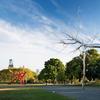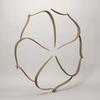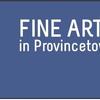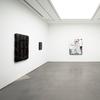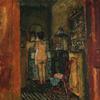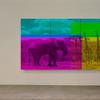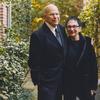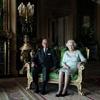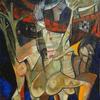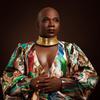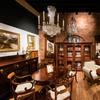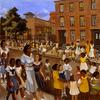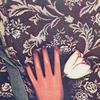Eros and Abstraction at American University Museum in Late Fall
- WASHINGTON, DC
- /
- November 09, 2016
Late fall exhibits at the American University Museum at the Katzen Arts Center are open Nov. 12 through Dec. 18.
Washington audiences get treated to a rare showing of renowned American realist artist Alex Katz’s recent black-and-white prints in Alex Katz: Black and White. The exhibit showcases the artist's lifelong interest in stripping color out of his prints and replacing sensual pleasure with intellectual design. Design versus color is an artistic debate that goes back to the Renaissance.
Katz, an established painter of modern life, came of age as an artist in 1950s New York and during the height of Abstract Expressionism. From his first exhibition in 1954 until now, Katz has produced paintings, drawings, sculpture and prints. His influences include films, billboard advertising, music, poetry and his friends and family.
Career surveys for Squeak Carnwath and feminist artist Martha Wilson explore a variety of media engaged in by both artists. Martha Wilson & Franklin Furnace highlights Wilson’s four decades creating innovative photographic and video works that explore her female subjectivity through role-playing, costume transformations and invasions of other people’s personae. The exhibit will include photos and texts of Wilson’s impersonation of Donald J. Trump, a persona she adopted to kick off Creative Time Summit. Wilson is the founder and director of Franklin Furnace, an artist-run space that champions the exploration, promotion and preservation of artists’ books, installation art, video, online and performance art, further challenging institutional norms, the roles artists play within society, and expectations about what constitutes acceptable art mediums.
Carnwath’s show, Crazy Paper and Sister Scissors, spans 30 years. The philosophical and mundane experiences of daily life are found in her paintings and prints, which can be identified by lush fields of color combined with text, patterns, and identifiable images. She is Professor Emerita at the University of California, Berkeley and lives and works in Oakland. Melissa Ichiuji is a Washington, D.C. artist whose work is presented by the museum’s Alper Initiative for Washington Art. Ichiuji’s Make You Love Me is a celebration of female eroticism, vulnerability and divine feminine wisdom. In Ichiuji’s uniquely performative and hybrid sculptures are bodies made from welded steel or vintage textiles combined with machine parts, metal, wood, leather, ceramic, found objects, an intersection of taboo and fetish, the bubbling up of repressions and deflections in fantasies achieving form. Many of the childlike doll figures are also emblems of play, prompting recall of what having a body was like when there weren’t any adults around to police appropriate behavior.
Ichiuji’s cultural heritage is rooted in the southern traditions of the American Appalachian Mountains. Appalachian culture is steeped in supernatural folklore and its people have a special fondness for things eccentric and bizarre. Ichiuji started making small figures when she was 6, after a house fire left her family homeless and mother severely depressed. She refused to go to school, not wanting to leave her mother alone. When her mother returned to working full time, Ichiuji missed her and started taking her nylon stockings and other family members personal items to incorporate into dolls. These bits of clothing and artifacts that belonged to her loved ones were infused with familiar scents and provided comfort.
D.C. artist Sylvia Snowden’s The Feel of Paint, an exhibition of large-scale impasto paintings, and mixed media of aluminum, mirror, and cork, uses different tactile textures based on universal symbolic shapes. As Benjamin Forgey observed: “In all of their darkness and light, individually and as a group, these masterful late works most impressively bespeak an artist at the height of her powers, a person able to reach within herself to mine profound lodes of empathy, understanding and vitality.”
In keeping with the museum’s mission to showcase political art, in the Kreeger Lobby outside of the museum is The High Stakes of Macedonia’s Colorful Revolution, an exhibition of photographs that tell the story of the Colorful Revolution. Several years ago, the government of the Republic of Macedonia embarked on a highly controversial and hugely expensive "urban renewal" of the capital city, Skopje. Most of this renewal consisted of large monuments of "historic figures" and new, quasi-classical facades over old buildings. This year, these monuments and buildings came under attack by various groups of citizens of this multi-ethnic country who rose together in street protests. Some of the protesters have been arrested and indicted for vandalism. The protests have continued unabated.
The American University Museum is a three-story public museum and sculpture garden located within the university’s Katzen Arts Center. The region’s largest university facility for exhibiting art, the museum has a permanent collection that highlights the donors’ holdings and AU’s Watkins Collection and Rothfeld Collection. Rotating exhibitions emphasize regional, national, and international contemporary art.
The Katzen Museum Store is open during museum hours plus one hour before select special events. Visitors may purchase books, catalogs, and prints related to past and current exhibitions, as well as fine crafts and other one-of-a-kind objects by predominantly local artisans.
The Katzen Arts Center, named for Washington-area benefactors Dr. and Mrs. Cyrus Katzen, brings all the visual and performing arts programs at AU into one space. Designed to foster interdisciplinary collaboration in the arts, the Katzen includes the museum, the Abramson Family Recital Hall, the Studio Theatre, a dance studio, an electronics studio, artists’ studios, rehearsal space, and classrooms.
The American University Museum at the Katzen Arts Center is open from 11 a.m. to 4 p.m. Tuesday through Sunday. Admission is free. For more information, call 202-885-1300 or look on the Web at www.american.edu/cas/museum.

